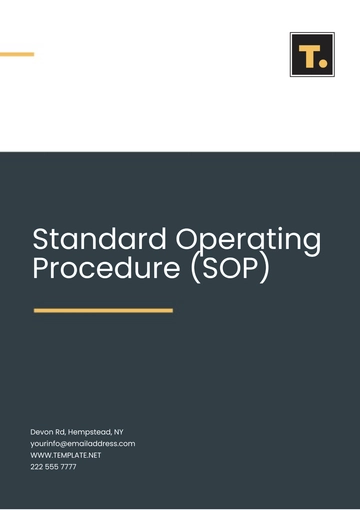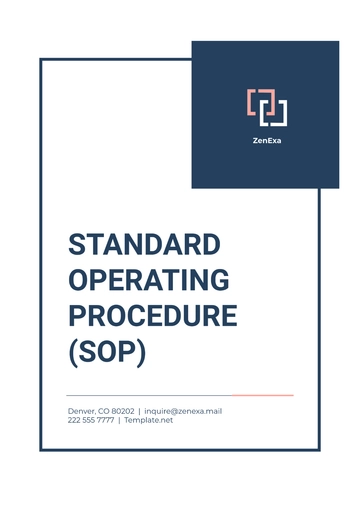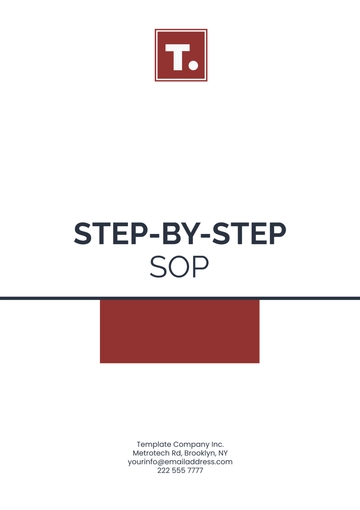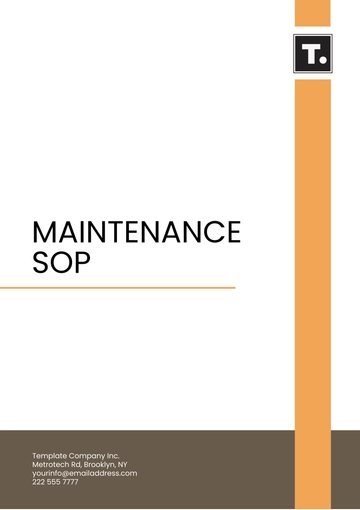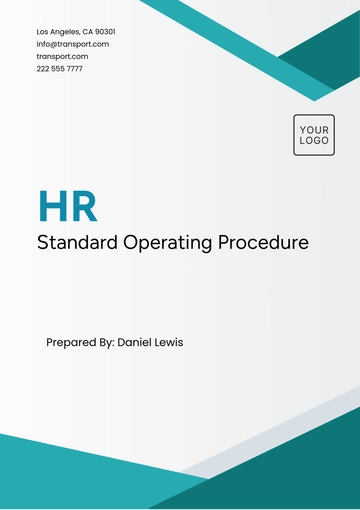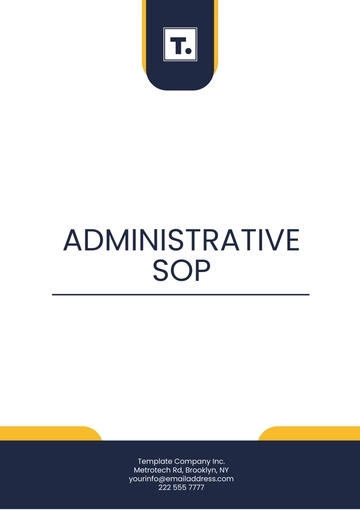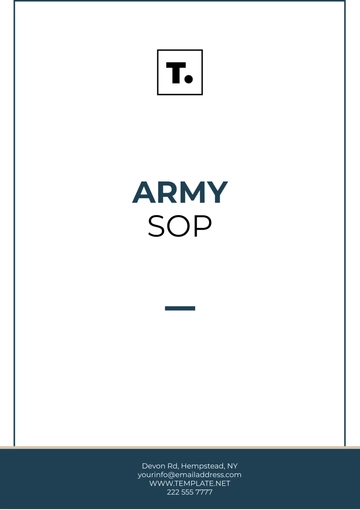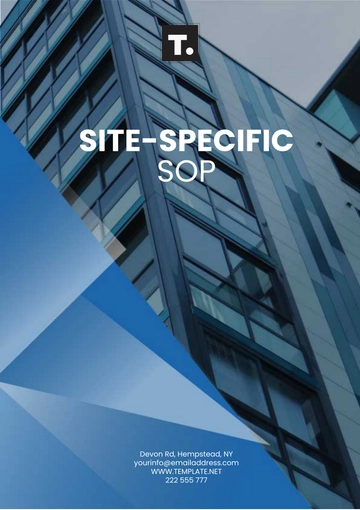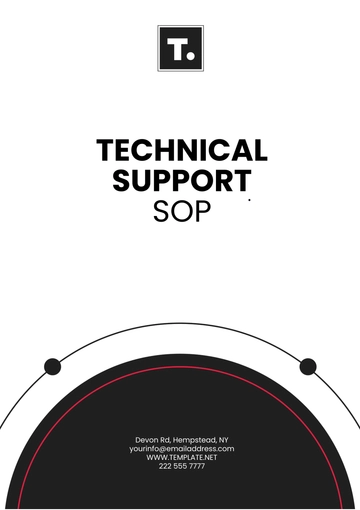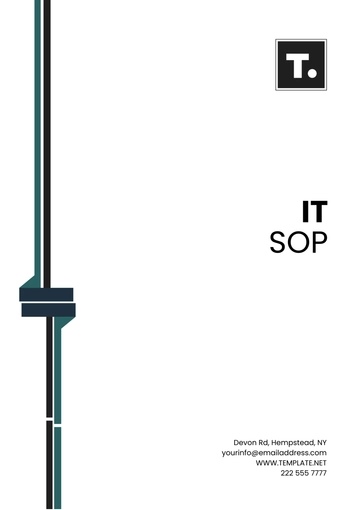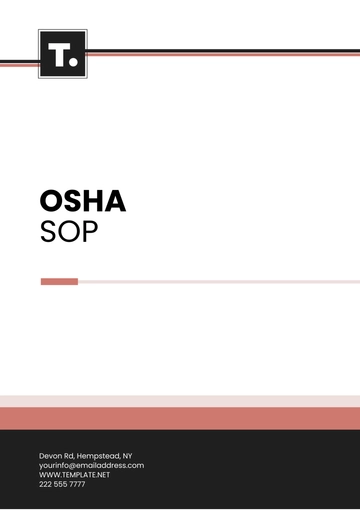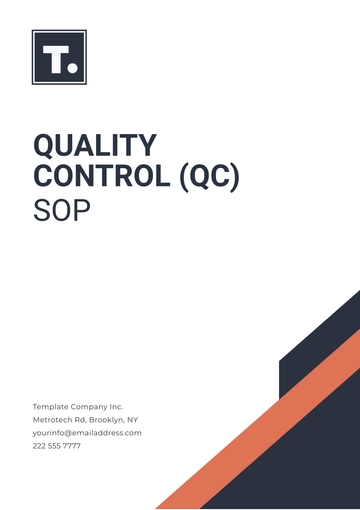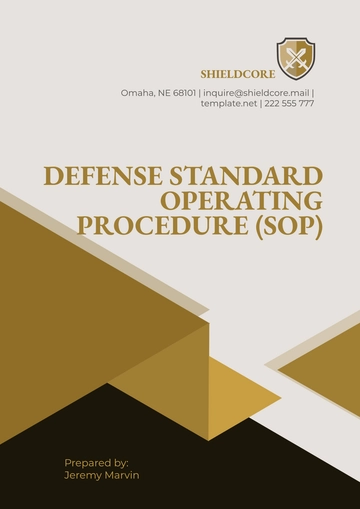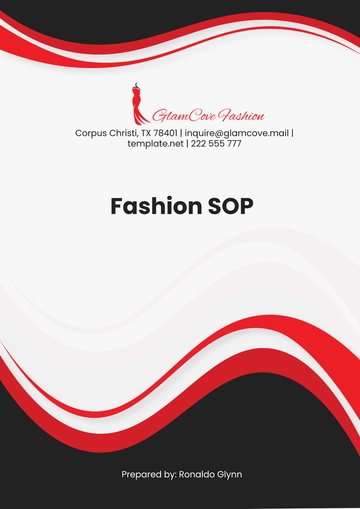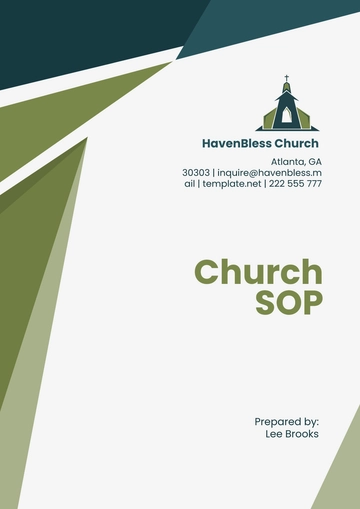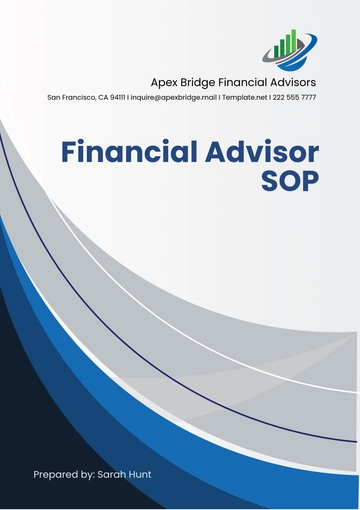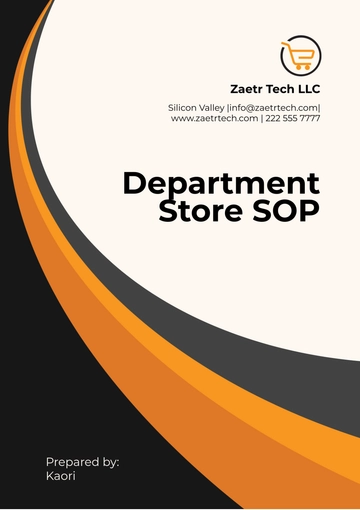Free Hotel Finance SOP
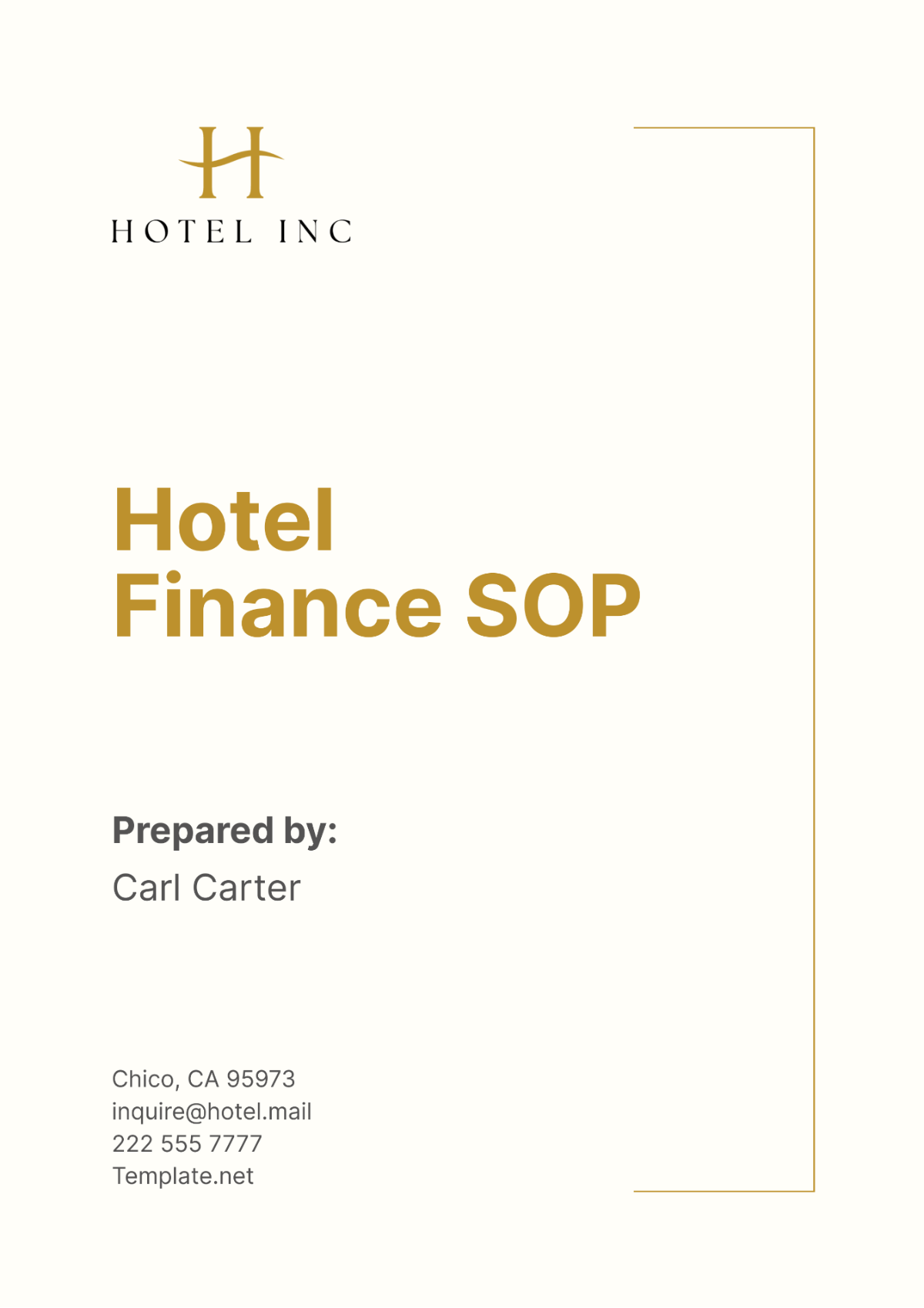
I. Purpose
The objective of this Standard Operating Procedure (SOP) is to outline the Hotel Finance procedures at [Your Company Name] to ensure accurate and timely financial management and reporting in compliance with applicable laws and internal policies. This SOP is designed to establish a clear and consistent framework for managing the hotel’s financial activities, including budgeting, accounting, financial reporting, and internal controls. By adhering to these procedures, [Your Company Name] aims to maintain financial integrity, transparency, and accountability, thereby supporting the hotel’s operational efficiency and strategic goals.
Specifically, this SOP seeks to:
Ensure compliance with federal, state, and local financial regulations, including Generally Accepted Accounting Principles (GAAP) and the Internal Revenue Service (IRS) guidelines.
Promote accurate and timely recording of all financial transactions, ensuring that financial records reflect the true state of the hotel's financial position.
Establish robust internal controls to prevent fraud, errors, and mismanagement of funds.
Facilitate effective financial planning and budgeting processes to support the hotel's strategic objectives and operational needs.
Provide clear guidelines for financial reporting to internal and external stakeholders, ensuring transparency and reliability of financial information.
Enhance the ability of management to make informed financial decisions based on accurate and timely financial data.
By following this SOP, [Your Company Name] will ensure that all financial activities are conducted in a consistent, reliable, and legally compliant manner, thereby safeguarding the financial health and reputation of the hotel.
II. Scope
This SOP applies to all financial operations and personnel within the Finance Department of [Your Company Name]. It encompasses the complete range of financial activities including, but not limited to, budgeting, accounting, payroll processing, financial reporting, internal controls, and compliance with applicable laws and standards. All members of the Finance Department, from entry-level staff to senior management, are required to adhere to the procedures outlined in this document to ensure the integrity and accuracy of the hotel’s financial processes.
Furthermore, this SOP extends to interactions with other departments within [Your Company Name] that have an impact on financial transactions and reporting. These departments include, but are not limited to, Human Resources, Operations, Sales, and Purchasing. Collaboration and communication between departments are essential to maintain accurate financial records and compliance with internal policies and external regulations.
By adhering to this SOP, [Your Company Name] aims to establish a unified approach to financial management, ensuring consistency, reliability, and compliance across all financial activities and personnel within the organization.
III. Responsibilities
Understanding the specific roles and responsibilities within the Finance Department of [Your Company Name] is crucial for effective financial management and compliance. The following outlines the duties of key personnel, including the Financial Manager, Accounting Staff, and Internal Auditor. These roles encompass overseeing financial operations, maintaining accurate financial records, and conducting audits to ensure adherence to internal policies and regulatory standards. Clearly defining these responsibilities ensures accountability, fosters efficient operations, and upholds the integrity of the hotel’s financial processes.
1. Financial Manager
The Financial Manager is responsible for overseeing all financial operations within [Your Company Name]. This includes the preparation and management of budgets, financial reporting, and ensuring that all financial activities comply with both internal policies and external regulations. The Financial Manager's specific duties include:
Developing and managing the annual budget in collaboration with department heads to ensure alignment with the hotel’s strategic goals.
Monitoring financial performance against the budget, identifying variances, and implementing corrective actions as necessary.
Preparing comprehensive financial reports for senior management, stakeholders, and regulatory bodies, ensuring that these reports are accurate, timely, and comply with Generally Accepted Accounting Principles (GAAP).
Ensuring the implementation of robust internal controls to safeguard the hotel’s financial assets and prevent fraud.
Overseeing the accounts payable and receivable processes to ensure timely and accurate payment of obligations and collection of receivables.
Coordinating with external auditors and regulatory agencies during financial audits and reviews, providing necessary documentation and explanations.
Keeping abreast of changes in financial regulations and accounting standards, and ensuring the hotel’s financial practices are updated accordingly.
2. Accounting Staff
The Accounting Staff are responsible for recording financial transactions, maintaining accurate financial records, and assisting in the preparation of financial statements. Their key responsibilities include:
Accurately recording all financial transactions in the hotel’s accounting system, ensuring that entries are made in a timely and precise manner.
Maintaining and reconciling the general ledger, ensuring all accounts are balanced and discrepancies are investigated and resolved promptly.
Assisting in the preparation of monthly, quarterly, and annual financial statements, providing detailed reports on the hotel’s financial status.
Managing payroll processing to ensure employees are paid accurately and on time, and that all payroll-related taxes and deductions are properly recorded and remitted.
Handling accounts payable by processing invoices, verifying expenditures, and ensuring timely payment to vendors.
Managing accounts receivable by generating invoices, tracking payments, and following up on overdue accounts.
Supporting the Financial Manager in budget preparation and financial analysis as required.
3. Internal Auditor
The Internal Auditor is responsible for auditing financial records and processes to ensure compliance with internal policies and regulations. The Internal Auditor’s duties include:
Conducting regular and systematic audits of financial records and operations to assess compliance with internal controls, policies, and procedures.
Evaluating the effectiveness of internal controls and making recommendations for improvements to enhance financial integrity and reduce the risk of fraud.
Reviewing financial statements and reports to ensure accuracy and adherence to GAAP and other relevant standards.
Investigating any discrepancies or irregularities identified during audits and working with the relevant personnel to resolve these issues.
Preparing detailed audit reports for senior management, outlining findings, recommendations, and corrective actions.
Monitoring the implementation of audit recommendations and ensuring that corrective actions are completed in a timely manner.
Staying updated on changes in audit regulations and best practices to ensure the hotel’s audit processes remain current and effective.
IV. Financial Reporting
Effective financial reporting is essential for [Your Company Name] to monitor its financial performance, make informed decisions, and ensure compliance with regulatory requirements. All financial reports must be prepared accurately and submitted in a timely manner to facilitate transparency and accountability. The following are the key reports required:
1. Monthly Financial Statements
Monthly financial statements provide a snapshot of [Your Company Name]'s financial position, including its assets, liabilities, and equity, as of the end of each month. These statements typically include:
Balance Sheet: Summarizes the hotel’s assets, liabilities, and equity at a specific point in time.
Income Statement: Shows the hotel’s revenues, expenses, and profits or losses over a period of time.
Cash Flow Statement: Tracks the hotel’s cash inflows and outflows during the month.
2. Quarterly Profit and Loss Statements
Quarterly profit and loss statements, also known as income statements, detail [Your Company Name]'s revenues, expenses, and profits or losses over a three-month period. These statements provide insights into the hotel’s financial performance and help identify trends that may require management attention. Quarterly profit and loss statements are crucial for assessing the hotel’s profitability and making strategic decisions.
3. Annual Budget Reports
Annual budget reports outline [Your Company Name]'s financial plan for the upcoming year, detailing expected revenues, expenses, and profits. These reports serve as a roadmap for financial management, guiding resource allocation and spending decisions. Annual budget reports are used to monitor the hotel’s financial performance against its planned targets and make adjustments as necessary to ensure financial stability and growth.
Accurate and timely financial reporting is essential for [Your Company Name]'s financial health and sustainability. By preparing and submitting these key reports consistently, [Your Company Name] can maintain transparency, comply with regulatory requirements, and make informed decisions to achieve its financial goals.
V. Budget Preparation
Budget preparation is a crucial process that requires careful planning, analysis, and collaboration to ensure [Your Company Name]'s financial resources are allocated effectively. The following steps outline the budget preparation process:
1. Collect Financial Data and Historical Trends
The first step in budget preparation is to gather relevant financial data and analyze historical trends. This includes reviewing past budgets, financial statements, and operational data to identify patterns and forecast future financial needs.
2. Consult with Department Heads for Budget Requirements
Once the financial data has been collected, it is essential to consult with department heads to gather input on budget requirements. Department heads are responsible for providing detailed information on their department's needs, including staffing, equipment, and operational expenses.
3. Prepare a Draft Budget and Review with the Financial Manager
Based on the financial data and input from department heads, prepare a draft budget that outlines projected revenues and expenses for the upcoming period. This draft budget should align with the hotel’s strategic goals and financial objectives. Once the draft budget is prepared, review it with the Financial Manager to ensure accuracy and feasibility.
4. Final Approval by the General Manager
After reviewing the draft budget, seek final approval from the General Manager. The General Manager will review the budget to ensure it aligns with the hotel’s overall financial plan and strategic direction. Once approved, the budget becomes the official financial plan for the upcoming period.
The budget preparation process is a collaborative effort that involves collecting and analyzing financial data, consulting with department heads, and obtaining final approval from the General Manager. By following these steps, [Your Company Name] can develop a comprehensive budget that supports its financial goals and operational needs.
VI. Accounts Payable
Proper management of accounts payable is crucial for maintaining positive vendor relationships and ensuring timely payment of obligations. The following steps outline the process for processing invoices in a systematic and efficient manner:
1. Receive and Verify Invoices for Accuracy
The first step in the accounts payable process is to receive invoices from vendors and verify their accuracy. This involves checking the invoice details, such as the billing amount, payment terms, and vendor information, against purchase orders and receiving reports to ensure that the goods or services were received as expected.
2. Obtain Necessary Approvals from Department Heads
After verifying the invoices, obtain necessary approvals from department heads or authorized personnel before processing payment. This step ensures that the expenses are legitimate and have been authorized by the appropriate department.
3. Record the Invoices in the Accounting System
Once the invoices are verified and approved, record them in the accounting system. This involves entering the invoice details, such as the invoice number, date, amount, and vendor information, into the system to create a record of the transaction.
4. Ensure Payment is Made by the Due Date
Monitor the due dates of invoices to ensure timely payment. Set up reminders or alerts to notify the accounts payable team of upcoming payment deadlines. Process payments through the approved payment methods and ensure that payments are made on or before the due date to avoid late fees or penalties.
Effective management of accounts payable is essential for [Your Company Name]'s financial health and reputation. By following these steps, [Your Company Name] can ensure that invoices are processed accurately, payments are made on time, and vendor relationships are maintained. This process also helps to prevent fraud and errors in accounts payable transactions, contributing to the overall efficiency and transparency of the hotel’s financial operations.
VII. Accounts Receivable
Effective management of accounts receivable is essential for maintaining a healthy cash flow and ensuring timely collection of payments from customers. The following steps outline the process for managing accounts receivable:
1. Issue Invoices to Customers in a Timely Manner
Issuing invoices promptly is crucial for ensuring timely payment from customers. Invoices should include all relevant details, such as the billing amount, payment terms, due date, and any applicable discounts or penalties for late payment. Send invoices to customers as soon as goods or services are delivered to expedite the payment process.
2. Follow Up on Outstanding Receivables Regularly
Regularly follow up with customers who have outstanding receivables to remind them of their payment obligations. This can be done through phone calls, emails, or letters. Establish a systematic follow-up schedule to ensure that no overdue invoices are overlooked. Maintain clear communication with customers regarding their payment status and any issues that may arise.
3. Record Received Payments Accurately in the Accounting System
When payments are received from customers, record them accurately in the accounting system. Match each payment to the corresponding invoice to maintain an accurate accounts receivable ledger. Ensure that payments are applied to the correct invoices and that any discounts or adjustments are properly accounted for.
4. Monitor Aging of Receivables
Regularly monitor the aging of receivables to identify overdue accounts and take appropriate actions to collect payment. Aging reports categorize outstanding receivables by the length of time they have been outstanding, allowing you to prioritize collections efforts.
Effective management of accounts receivable is essential for maintaining a healthy cash flow and ensuring the financial stability of [Your Company Name]. By following these steps, [Your Company Name] can streamline its accounts receivable process, improve collections efficiency, and reduce the risk of bad debts. Consistent monitoring and follow-up on outstanding receivables are key to maximizing cash flow and maintaining positive customer relationships.
VIII. Internal Controls
Implementing strong internal controls is crucial for [Your Company Name] to safeguard its financial assets and prevent fraud or mismanagement. The following internal controls will be implemented:
1. Segregation of Duties
Segregation of duties ensures that no single individual has control over all aspects of a financial transaction. For example, the individual responsible for recording financial transactions should not be the same person responsible for authorizing or approving those transactions. This control helps prevent errors and fraud by ensuring that multiple individuals are involved in each transaction.
2. Regular Reconciliations
Regular reconciliations of financial accounts, such as bank accounts and accounts receivable, should be performed to ensure that the balances in the accounting records match the actual balances. Reconciliations help identify discrepancies or errors in a timely manner, allowing for prompt correction.
3. Physical Security of Financial Documents
Physical security measures, such as locked filing cabinets and restricted access to financial documents, should be implemented to prevent unauthorized access or tampering. This control helps protect sensitive financial information from theft or misuse.
4. Periodic Internal Audits
Periodic internal audits should be conducted to evaluate the effectiveness of internal controls and identify any weaknesses or areas for improvement. Internal audits help ensure compliance with internal policies and external regulations, and they provide management with assurance that financial activities are being conducted in accordance with established procedures.
By implementing these internal controls, [Your Company Name] can enhance the integrity and reliability of its financial operations, reduce the risk of fraud or errors, and ensure compliance with applicable laws and regulations. Regular monitoring and evaluation of internal controls are essential to adapt to changing circumstances and maintain an effective control environment.
IX. Compliance
Ensuring compliance with applicable laws, regulations, and company policies is essential for [Your Company Name]'s financial activities. The Financial Manager plays a critical role in this regard by ensuring that all team members are aware of and adhere to these requirements. Compliance includes adhering to tax regulations, accounting standards, and internal controls to safeguard financial assets and maintain the trust of stakeholders. Regular audits and reviews should be conducted to assess compliance and identify areas for improvement. By prioritizing compliance, [Your Company Name] can mitigate risks and ensure the integrity and transparency of its financial operations.
X. Review and Updates
This SOP will be reviewed annually and updated as necessary. Any changes must be approved by the Financial Manager and the General Manager.
For any issues or concerns regarding this SOP, please contact [Your Company Email] or call [Your Company Number].
- 100% Customizable, free editor
- Access 1 Million+ Templates, photo’s & graphics
- Download or share as a template
- Click and replace photos, graphics, text, backgrounds
- Resize, crop, AI write & more
- Access advanced editor
Streamline your hotel's financial operations with the Hotel Finance SOP Template from Template.net. This editable and customizable template is designed to standardize financial procedures. Editable in our Ai Editor Tool, it allows you to easily tailor processes to meet your hotel’s specific financial management requirements.
